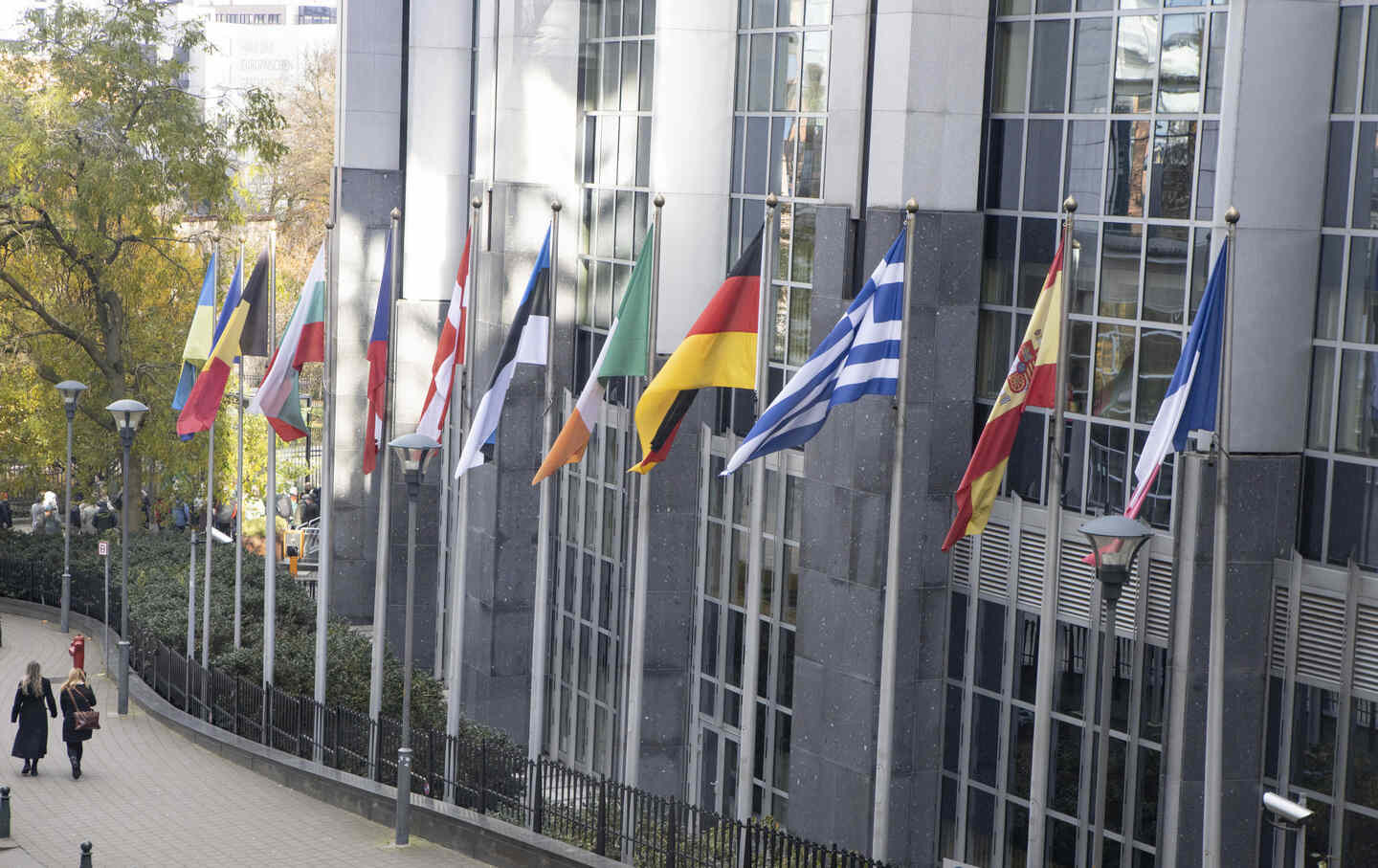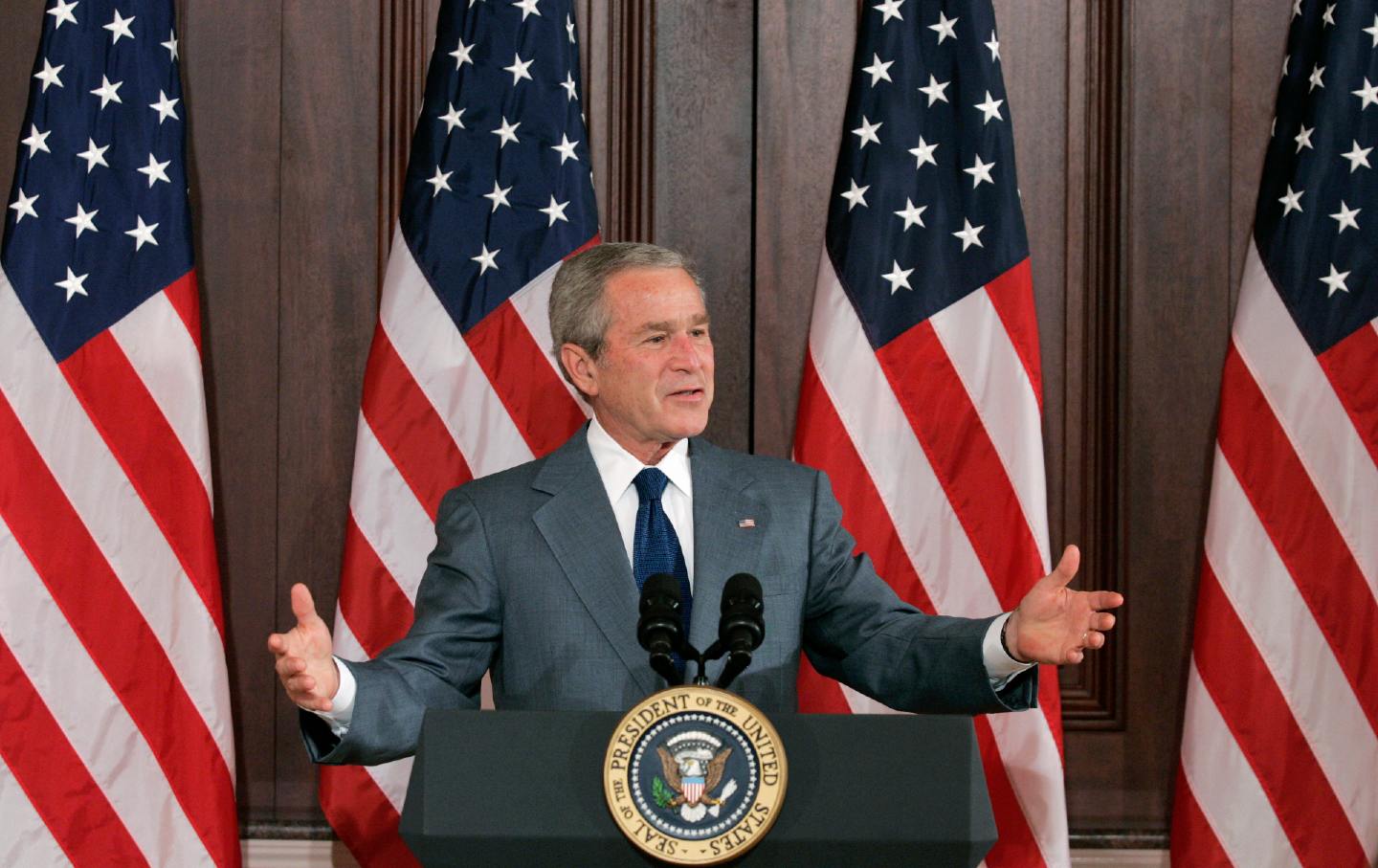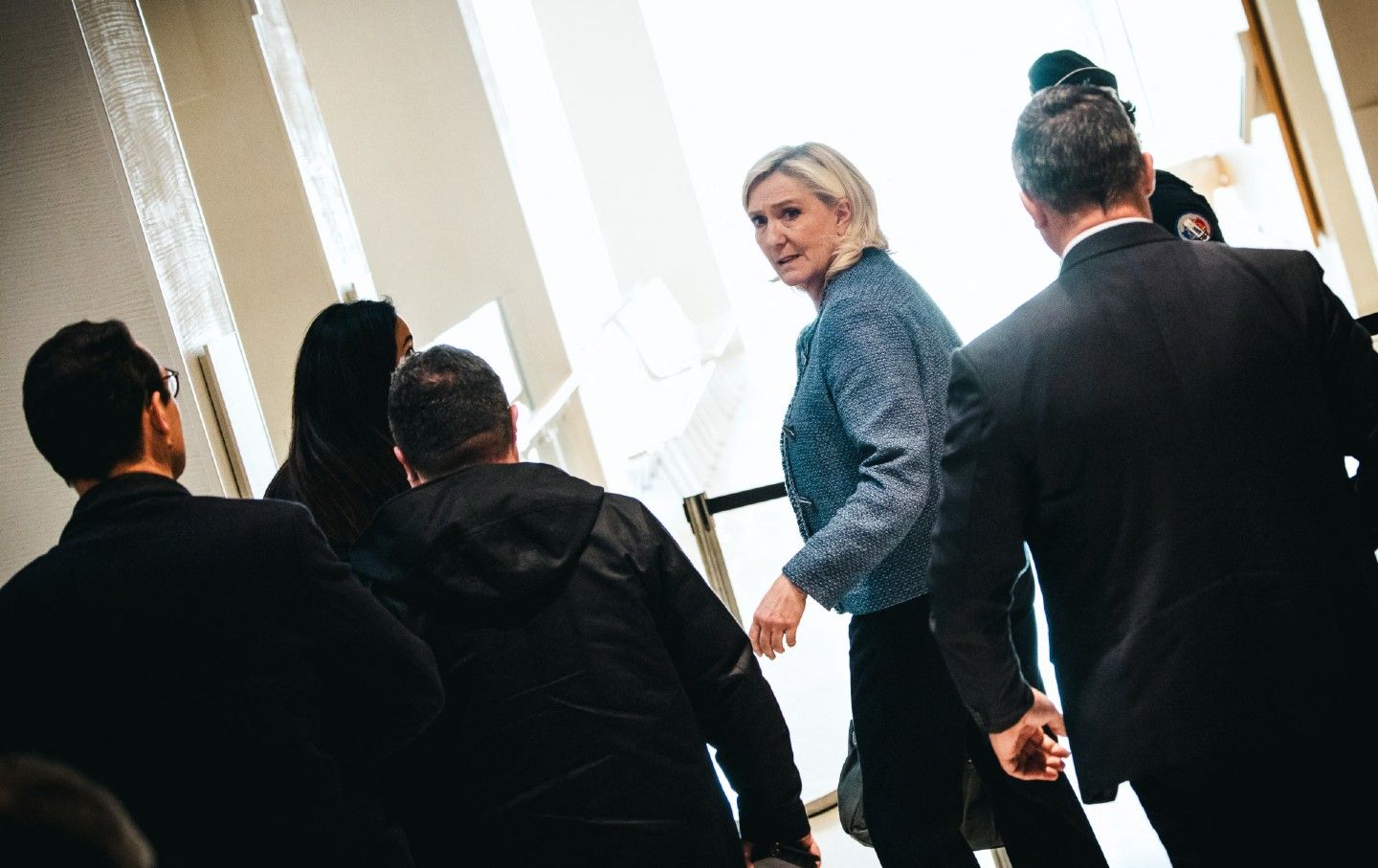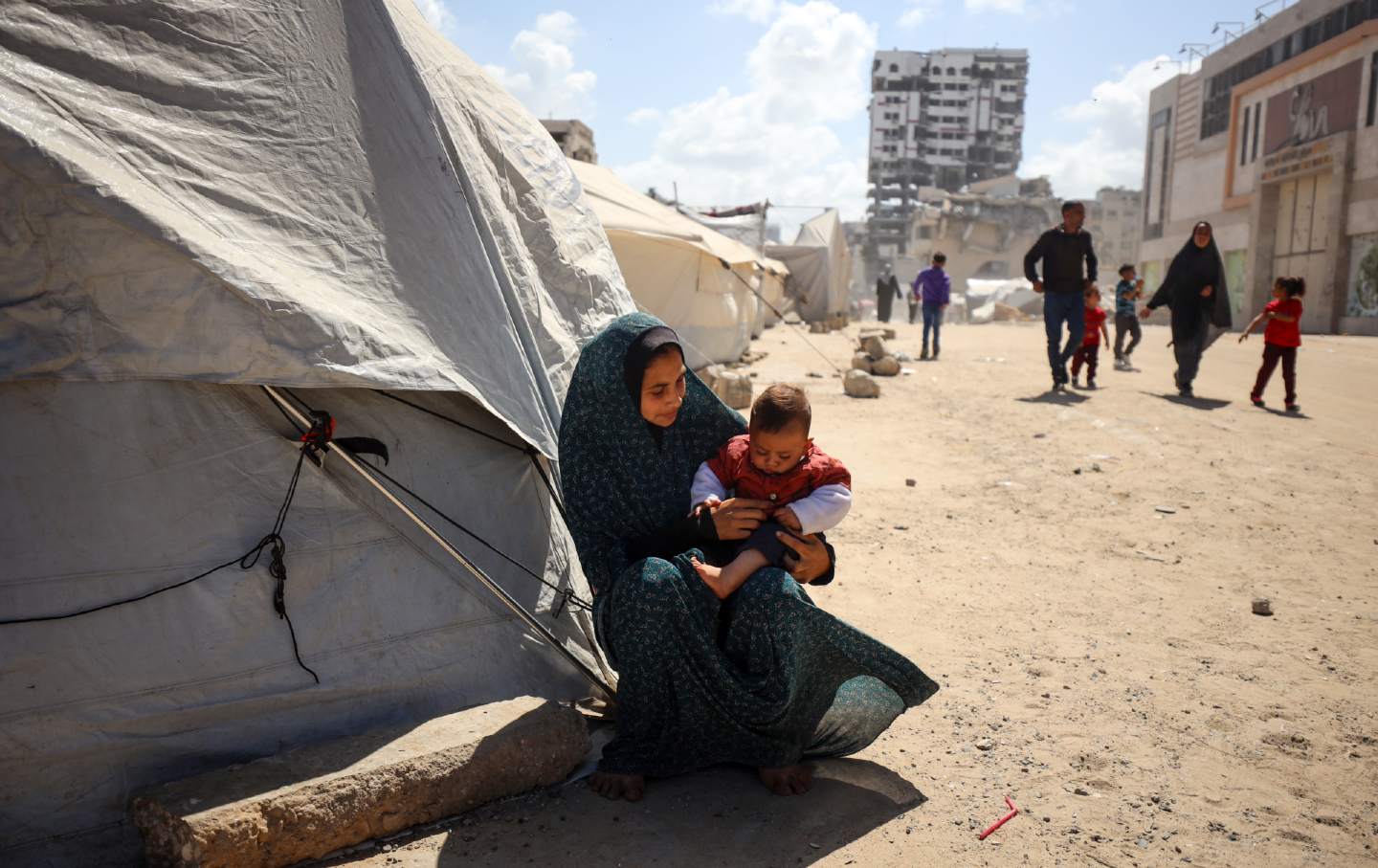Israel Is Using Starvation as a Weapon of War. Where Is the Outrage?
President Biden and other allies of Israel need to use their leverage to end the Gaza famine. The alternative is mass starvation and death.
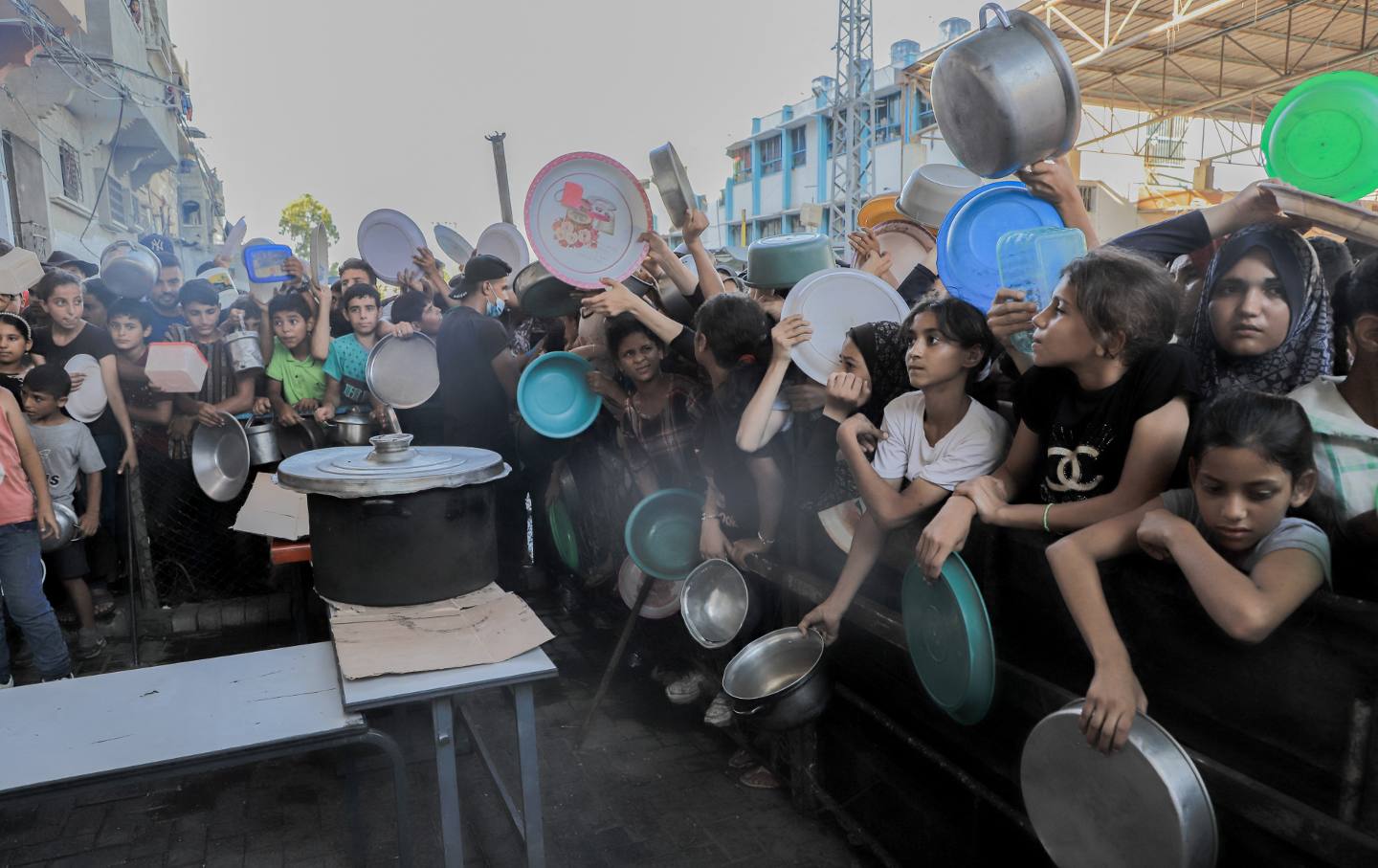
Displaced Palestinian children queue to receive food distributed by aid organizations in Beit Lahia, Gaza, on July 18, 2024.
(Abood Abusalama / Middle East Images / AFP via Getty Images)When starvation first started to spread in Gaza at the end of October 2023, the international community expressed alarm. The World Food Programme warned that “People in Gaza are starving to death right now. The speed at which this man-made hunger and malnutrition crisis has ripped through Gaza is terrifying.” The EuropeanUnion and the United States released statements urging Israel to open crossings and let in thousands of aid trucks. The argument then was that starvation should never be used as a weapon of war. Palestinians should not be starved for political reasons, or as a mechanism to push them out of Gaza. Israel, as the occupying power, has an obligation to ensure an adequate supply of crucial goods.
That was months ago. The humanitarian crisis in Gaza has only gotten worse by every measure. And the starvation of Palestinians has become normalized.
Today, starvation is spreading both in the north and south of Gaza, with little outcry from the international community. Despite a ruling from the International Court of Justice affirming that Israel’s actions are plausibly genocidal, Israel has faced no material consequences. How long will we allow these atrocities to continue?
The organization I work for, the American Friends Service Committee, still has staff on the ground in Gaza. We have continued to provide food, hygiene kits, and other forms of aid despite tremendous personal hardship. We’ve served food to over half a million people, but the aid we can provide is severely limited by what Israel allows into Gaza, and by the constant threat of Israel’s military operations.
Our ability to provide aid at all is due to the commitment and courage of our staff on the ground, who are local to Gaza and have connections to organizations and communities that make their work possible. It is now extremely difficult for international aid workers to get into Gaza, and many large organizations can’t provide aid because they lack local connections. It is only by chance that our staff are still alive—each have had dozens of family members killed by Israeli airstrikes.
When Israeli forces stormed Al-Shifa Hospital on November 15, 2023, there was unprecedented international outrage. But when Israel realized the international community would not go beyond words of condemnation, soldiers stormed the hospital again, killing hundreds, including patients and doctors. Hundreds more were arrested. Then, the Israeli military burned the hospital to the ground. When Israel saw that it could get away with its destruction of Al-Shifa, it did the same to many other hospitals in Gaza.
In April, three mass graves were uncovered at Al-Shifa; the dead included people with medical bandages and crutches. Others were executed with their hands tied behind their backs.
We see a similar escalation with Israel’s limitations on food aid and the spread of starvation in Gaza.
Palestinians were already familiar with the weaponization of hunger. Since 2007, Gaza has been under a tight Israeli siege, and the Israeli military limited the amount of food they allowed to cross the border based on the minimum number of calories Palestinians needed to avoid malnutrition. At the time, leaders in the international community mostly looked the other way. Palestinians in Gaza learned years ago that their death is acceptable.
Soon after October 7, 2023, Israeli Defense Minister Yoav Galant infamously said, “There will be no electricity, no food, no fuel—everything is being blocked off.” Tali Gottlieb, a member of the Knesset, said Palestinians in Gaza need to be “thirsted and starved.” Even when international pressure resulted in sending aid trucks to Gaza, Israel’s National Security Minister Itmar Ben Gvir sent his militias to block their entry. On May 1, one of AFSC’s aid trucks was in a convoy that was attacked by Israeli settlers.
Israel has repeatedly targeted starving Palestinians trying to get food. In the Tal Al-Hawa neighborhood in Gaza City, Israeli snipers shot people who came for aid. Similar scenes have played out across Gaza. At the Kuwait Roundabout, 25 Palestinians were killed on January 25, 2024. On March 23, in the same spot, Israel killed 23 more starving Palestinians. At the Al-Nabulsi Roundabout to the west of Gaza City, Israeli forces again targeted starving Palestinians waiting for aid trucks in the so-called “flour massacre,” killing 115 and injuring about 700. On June 18, 2024, Israeli forces killed eight security personnel in charge of guarding commercial trucks that entered Gaza at the Karim Abu Salem crossing. The inaction of governments around the world has given tacit permission for Israel to continue its starvation campaign.
By April 2024, Oxfam sounded the alarm that people in Northern Gaza were “forced to survive on 245 calories a day.” Instead of putting real pressure on Israel to allow more aid in, regional and international powers resorted to very expensive and ineffective means of aid delivery—including airdropping food that has actually killed some Palestinians and destroyed what remains of their agricultural fields. The United States also spent $320 million on a pier off the coast of Gaza that didn’t even last a month.
The situation is dire. Bombing hospitals and killing people waiting in line for food has been normalized. Words of disapproval mean nothing when the United States continues to ship bombs. Starvation in Gaza is a man-made phenomenon, and it can be stopped.
Currently, the Rafah Crossing is completely closed and aid deliveries have slowed to a trickle. The food, the drivers and the trucks are all ready and waiting across the border. Some have been waiting for months. The food is rotting under the Egyptian sun and worms and insects are eating up shipments of food originally meant for the people of Gaza. A permanent ceasefire and the opening of all the land crossings and routes is the only way to safely and efficiently get the massive amount of aid that is needed to the people who will starve and die without it. Seeking complicated and costly alternatives is simply buying time for Israel to continue its genocidal campaign in Gaza.
Popular
“swipe left below to view more authors”Swipe →President Biden and other allies of Israel need to use their leverage—including withholding weapons and funding—to open these crossings, ensure the safe delivery of aid, and bring about a permanent ceasefire. The alternative is mass starvation and death.

